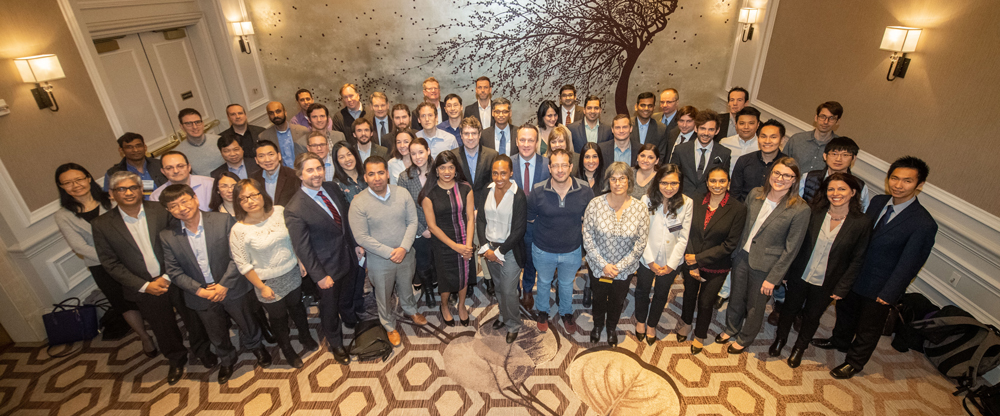Young Investigator Awards
MRA Young Investigator Awards aim to attract early career scientists with novel ideas into melanoma research, thereby recruiting and supporting the next generation of melanoma researchers. Young Investigators are scientists within four years of their first academic faculty appointment. A mentorship commitment from a senior investigator is required.
Identification of Metabolic Liabilities of Melanoma Cells:
Seeks to understand how melanoma metabolism changes when a tumor first forms and eventually spreads to other areas of the body.
MRA Young Investigator Award
Kivanc Birsoy, The Rockefeller University
Discovering Unconventional CD8+ T Cell Epitopes in Metastatic Cutaneous Melanoma:
Aims to develop cell-based therapies targeting a novel class of tumor antigens.
Bristol-Myers Squibb - MRA Young Investigator Award in Immunotherapy
Yiwen Chen, University of Texas MD Anderson Cancer Center
Optimization of GITR Antibodies for Melanoma Immunotherapy:
Focuses on enhancing the therapeutic activity of an immunostimulatory antibody to improve its anti-cancer activity.
MRA Young Investigator Award, collaboratively funded by Weizmann Institute of Science
Rony Dahan, Weizmann Institute of Science
Targeting Copy Number Alterations to Overcome Immune Evasion in Melanoma:
Will study how large scale deletions and amplifications of melanoma cell genomes contributes to therapeutic response and resistance.
Julie and Edward J. Minskoff - MRA Young Investigator Award
Teresa Davoli, New York University School of Medicine
The Multifaceted AMBRA1-based Signaling in Melanoma Response to Therapy:
Seeks to understand how the novel tumor suppressor gene AMBRA1 contributes to melanoma progression and responsiveness to treatment.
MRA Young Investigator Award
Daniela De Zio, Kraeftens Bekaempelse
Microbial Metabolites in Immunotherapy of Malignant Melanoma:
Investigates how a bacterial product found in the gut influences the responsiveness of melanoma to immunotherapy.
Bristol-Myers Squibb - MRA Young Investigator Award in Immunotherapy
Simon Heidegger, Technical University Munich
TANK-Binding Kinase 1 (TBK1) As A Novel Cancer Immunotherapy Target:
Will explore whether inhibiting the protein TBK1 can help enhance responsiveness and overcome resistance to anti-PD1 blockade.
Tara Miller Melanoma Foundation - MRA Young Investigator Award
Russell Jenkins, Massachusetts General Hospital
Transcriptional and Epigenetic Regulators of Melanoma Initiation:
Aims to use a zebrafish model of melanoma to identify the molecular events that drive the transition of normal melanocytes to malignant melanoma.
MRA Young Investigator Award
Charles Kaufman, Washington University in St. Louis
Investigating Host Immune Factors in Mediating Immune Related Adverse Event:
Will conduct studies to gain a better understanding of immune-related adverse events (irAEs) to expand immunotherapy use and prevent toxicities in patients.
Society for Immunotherapy of Cancer – MRA Young Investigator Award
Shaheen Khan, UT Southwestern Medical Center
Dissecting Tumor-Immune Cell Interactions in Uveal Melanoma:
Investigates how the immune system interacts with ocular melanoma cells and modulates their metastatic potential.
Ellen and Gary Davis - MRA Young Investigator Award
Ashley Laughney, Joan & Sanford I. Weill Medical College of Cornell University
Identifying New Molecular Targets and Drugs to Treat Resistant Melanoma:
Uses a unique chemical platform to identify novel drug leads to treat therapy-resistant melanoma.
Jill and Jay Bernstein - MRA Young Investigator Award
Nir London, Weizmann Institute of Science
Factors that Influence Artificial Intelligence-based Melanoma Diagnosis:
Uses artificial intelligence (AI) approaches to combine clinical images with patient metadata to improve melanoma diagnosis.
Michael and Jacqueline Ferro Family Foundation - MRA Young Investigator Award for Artificial Intelligence Applied to Melanoma
Veronica Rotemberg, Memorial Sloan-Kettering Cancer Center
Elucidating Cross-Presentation of Melanoma-Derived Antigens:
Aims to understand at a cellular level why some patients do not respond to checkpoint immunotherapy.
Lee Grinberg Family-MRA Young Investigator Award
Stefani Spranger, Massachusetts Institute of Technology

MRA Young Investigator Awardees

